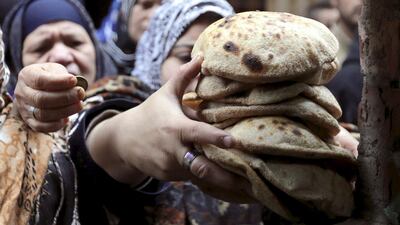Rising food prices pushed Egyptian inflation back to double digits last month as foreign exchange shortages hit importers.
Consumer inflation rose to an annualised rate of 11.1 per cent last month, up from 9.7 per cent in October. Food prices, which account for about 40 per cent of the index, rose to an annual rate of 14.7 per cent, up from 12.5 per cent the previous month.
High, entrenched inflation has made lifting the roughly 20 per cent of the population who live on less than US$1.90 per day out of poverty much more difficult. Per capita growth has remained at or below zero since 2011, as low growth rates, high inflation and rapid population growth have hit living standards.
But the overvalued Egyptian pound and a crackdown on black markets in US dollars, where foreign currency trades at a discount to official rates, is lifting prices higher.
By making it harder for importers to get the currency they need to bring food and manufacturers into the country, shortages of dollars are pushing prices up.
The rise in inflation is probably “the result of currency shortages, because firms have struggled to import goods”, said Jason Tuvey, an emerging markets economist at Capital Economics.
“Egypt is notorious for spikes in food inflation, because the country’s food logistics and infrastructure are quite poor. But at this time it is probably being exacerbated by currency shortages.”
In Cairo, soldiers and police have moved on to street corners to sell cheap food, according to Bloomberg, in what analysts have interpreted as a sign that devaluation – and a spike in food costs – is around the corner.
The appointment of Tarek Amer as the governor of the Egyptian central bank was interpreted by many as a sign that a currency devaluation is likely to come soon.
But this month’s inflation figures could make it less likely that the central bank, which frets that devaluing the currency will push up inflation further, will move to alter the exchange rate.
“High inflation may well give them pause for thought – Egyptian policymakers have always been a bit scared of high inflation because of the potential for social unrest,” Mr Tuvey said.
Nevertheless, “devaluation looks inevitable”, he said.
abouyamourn@thenational.ae
Follow The National's Business section on Twitter

